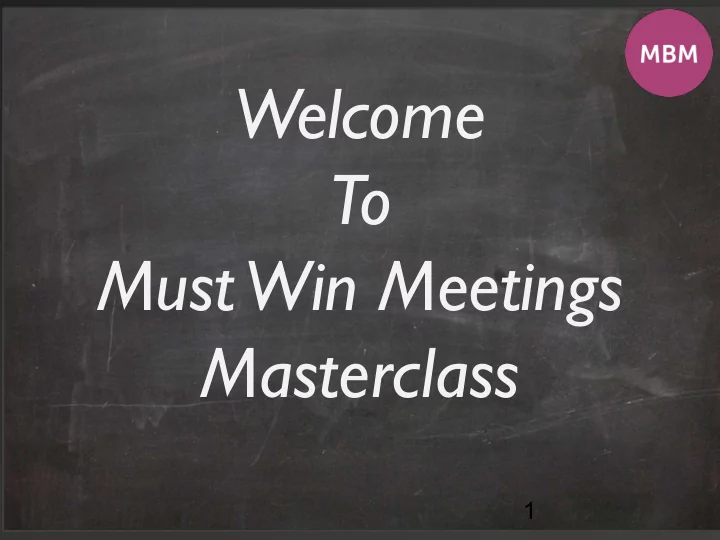

Welcome To Must Win Meetings Masterclass 1 1 www.makingbusinessmatter.co.uk
Learning Objectives By the end of this Masterclass you will be able to: 1. Capture your learnings better. 2. Recognise why your must win meetings work and do not work. 3. Identify your end in mind and why it is important. 4. Know what your audience is thinking before the meeting. 5. Prepare thoroughly for your meeting to achieve your end in mind. 6. Use the most effective presentation tools to achieve your end in mind.. 2 www.makingbusinessmatter.co.uk
3 www.makingbusinessmatter.co.uk
4 www.makingbusinessmatter.co.uk
Definition of great : adjective, greater, greatest. 1. unusually or comparatively large in size or dimensions: A great fire destroyed nearly half the city. 2. large in number; numerous: Great hordes of tourists descend on Europe each summer. 3. important; highly significant or consequential: the great MBM training event. 5 www.makingbusinessmatter.co.uk
6 www.makingbusinessmatter.co.uk
7 www.makingbusinessmatter.co.uk
Styles and decision making FACTS FUTURE Analyser Pathfinder FORM FEELINGS Organizer Talker 8 www.makingbusinessmatter.co.uk
Expectations of the audience A D Reacts unemotionally. Reacts spontaneously. Wants precise Prefers facts concepts “WHAT?” “WHY?” Reacts with emotion. Reacts cautiously. Requires neatness and Needs to feel punctuality enthusiasm “WHO?” “HOW?” C B 9 www.makingbusinessmatter.co.uk
‘Studying with quizzes helps make sure the material sticks’ …Or at least that is what Roddy Roediger, a psychology professor at Washington University, in St. Louis, discovered. He runs the school’s memory lab and has been studying how and why people remember for over 40 years. The main thrust of why we use quizzes on our courses is because of a piece of research Roddy conducted years ago. In essence, he asked 3 separate groups to study 60 images. The first group were asked to study the images. The second group were asked to study the images and then were tested once to se if they could recall the images. The third group were tested 3 times to see if they could recall the images. The results, one week later, were: – The first group’s recall was 16 out of 60. – The second group’s recall was 19 out of 60. – The third group’s recall was 32 out of 60. The phenomenon is known as the ‘Testing Effect’. 10 www.makingbusinessmatter.co.uk
11 www.makingbusinessmatter.co.uk
12 www.makingbusinessmatter.co.uk
This is an apple. 36 apples are used to create one gallon of apple cider and It is red with a green leaf coming from the stork. in the 14 century some children were baptised in cider, why? 13 www.makingbusinessmatter.co.uk
We are asking ourselves the wrong question. Instead of… ‘Who’s pulling together the deck?’ A better question is… ? 14 www.makingbusinessmatter.co.uk
15 www.makingbusinessmatter.co.uk
16 www.makingbusinessmatter.co.uk
Have greater influence with… 17 www.makingbusinessmatter.co.uk
#1: Start your PowerPoint on screen by simply pressing F5. #2: Press ‘N’ or left click on the mouse, or page down, or enter, or simply the down arrow to move to the next slide. #3: ‘P’ or backspace, or left, or up arrow, or page up to return to the previous slide. #4: Click ‘B’ to black out the screen, ‘B’ to return to where you were. #5: W’ …does the same with a white screen. #6: Click shift and F5 to return to that slide midway through #7: To show slide 22, type 22 and hit enter, make a mental note of where you were. 18 www.makingbusinessmatter.co.uk
‘Studying with quizzes helps make sure the material sticks’ …Or at least that is what Roddy Roediger, a psychology professor at Washington University, in St. Louis, discovered. He runs the school’s memory lab and has been studying how and why people remember for over 40 years. The main thrust of why we use quizzes on our courses is because of a piece of research Roddy conducted years ago. In essence, he asked 3 separate groups to study 60 images. The first group were asked to study the images. The second group were asked to study the images and then were tested once to see if they could recall the images. The third group were tested 3 times to see if they could recall the images. The results, one week later, were: – The first group’s recall was 16 out of 60. – The second group’s recall was 19 out of 60. – The third group’s recall was 32 out of 60. The phenomenon is known as the ‘Testing Effect’. 19 www.makingbusinessmatter.co.uk
Thank you 20 20 www.makingbusinessmatter.co.uk
Recommend
More recommend